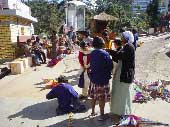 |
| ‘Christmas is a time for rejoicing and feasting. The destitutes of Shanti Bhavan of the Missionaries of Charity join in the merrymaking in Shillong’ |
When you give a luncheon or dinner, do not invite your friends, your brothers or relatives, or your rich neighbours; if you do, they may invite you back and so you will be repaid. But when you give a banquet, invite the poor, the crippled, the lame, the blind, and you will be blessed. Although they cannot repay you, you will be repaid at the resurrection of the righteous.” Luke 14:12-14.
They are called the dregs of society and live in a world that is gruesome and gray. But when Christmas arrives in all its splendour, the silver streak belies the dark clouds. Take the case of Billy Warjri, a rag picker, who knows all about wish fulfilment. While he may not get those expensive toys, Billy dons new clothes and tucks into cakes and sweets distributed by the Missionaries of Charity.
The beggars on the streets and the destitutes from the dump can hope and dream at Christmas time. For, the Good Samaritan among Christians brings sunshine into joyless lives.
So who said that Santa Claus is meant only for rich kids or the fact that compassion no longer exists in our consumerist society? Amid the frenzy of buying and splurging, there are those who have a way of reaching out to the have-nots and underprivileged. “Sparing a thought for the less-fortunate is quite in keeping with the spirit of the festival. After all, Christmas is all about sharing and giving which is what makes it so meaningful,” says Ferdy Dkhar, band member of the Mojo band and currently the anchor of several AIR programmes.
Two winters ago, Ferdinand and his band performed at a free concert at Shillong’s Fire Brigade Ground. Their aim was to create not just great music but collect clothes and books for the underprivileged. Needless to say, he got “a great response” from the audience. Ferdy now longs to host a Christmas carnival to raise funds for Shillong’s poor and impoverished. But it all depends on whether the different Church denominations can come closer to express their solidarity.
The spirit of sharing is deeply entrenched in Khasi culture and society. “Our clans do not allow people to go hungry. So there aren’t any beggars on the streets,” explains Ampareen Lyngdoh, a mass communication lecturer and filmmaker. She says the doctrine of the Bible talks about loving one’s neighbour, which is very similar to the edicts of Khasi society.
“Christmas provides us with an opportunity to extend the feelings of brotherhood and charity. Not surprisingly, both Christianity and Khasi traditions have merged to forge a meaningful relationship,” adds Lyngdoh.
C hristianity has taught educationist and former chairman of the Meghalaya Public Service Commission Alvareen Dkhar that “it is better to give unto others than to receive”. Every Christmas, she makes it a point to invite orphans or street urchins to her house to partake of a feast. “When I am out shopping for Christmas, I think about all those parents who are too cash strapped to buy clothes for their children. I try to give whatever gifts I can to kids of such families,” says a publicity-shy Alvareen.
Christmas is one reason for the Church to reach out to the grassroots. Rev. Preseley B. Lyngdoh of the Presbyterian Church of India hasn’t known a moment’s respite in the run-up to the Christmas celebrations.
He has visited the poor children of the sweeper’s line at Burrabazar to hold a Christmas prayer and distribute gifts donated by his parishioners. “I strongly believe that Christmas is meant mostly for the children. Since Christ came for the poor, why don’t we follow His path and do our bit for mankind’s benefit?” he asks.
Even the old and the infirm at Nongthymmai’s Mercy Home seem more radiant than usual. They were treated to cakes by St Edmund’s School students while children of Holy Child School sang Christmas carols and distributed money, toiletries and biscuits. “The Assam Rifles officials from Happy Valley make it a point to bring old clothes every year and All Saints Cathedral members sing carols and distribute Christmas gifts among the home’s inmates,” says sister Delphine.
Christmas is a time for rejoicing and feasting. The destitutes of Shanti Bhavan of the Missionaries of Charity join in the merrymaking. “By giving gifts to the destitute and the street children, we are carrying on God’s work of spreading love and happiness,” says Sister Consolata, regional superior, Northeast, Missionaries of Charity. She has visited the 250 inmates of Shillong’s jail to distribute clothes and food packets. The 100-odd street children who throng Shanti Bhavan every Sunday would be given new clothes and a sumptuous meal. The nuns plan to take them for a picnic at Barapani and play games with them to fill their Christmas with laughter and joy. “One of the destitute inmates is stitching clothes for the children even though he used to suffer from arthritis,” said Sister Consolata. She added that at no time in the year, does she see so many acts of kindness around her.
The charitable tradition of Christmas goes back to Boxing Day (the day following Christmas), which originated in the Middle Ages around 800 years ago. Churches would open their “alms box” (boxes in which people had placed gifts of money) and distribute the contents to poor people in the neighbourhood on the day after Christmas.
Before the mid-19th century, gifts were given by the rich to the poor. The latter would go to the local church or the estate of a nobleman — later any wealthy citizen — asking for alms. They might receive money, a meal, or some other treat. In many instances, the carol singers demanded food. While the tradition of gift-giving continues even today, it has acquired newer dimensions in different cultures and countries.
In Shillong, Boxing Day heralds a community feast (Bam Christmas) for both the rich and the poor. “It doesn’t matter if a member can’t afford to pay for this banquet since it is open to all parishioners irrespective of their social standing,” says crooner Natalie Syiem, who emphasises that Christmas cuts across all sections of the society.
Amid the Christmas decorations, cards and carols, Christians are reminded of a line from the Psalms: “He hath dispersed abroad; He hath given to the poor: His righteousness remaineth forever.” Christmas evokes compassion and rekindles the goodness inherent in man. If only the Yuletide spirit were to last every day, the world would have been a better place for everyone.











